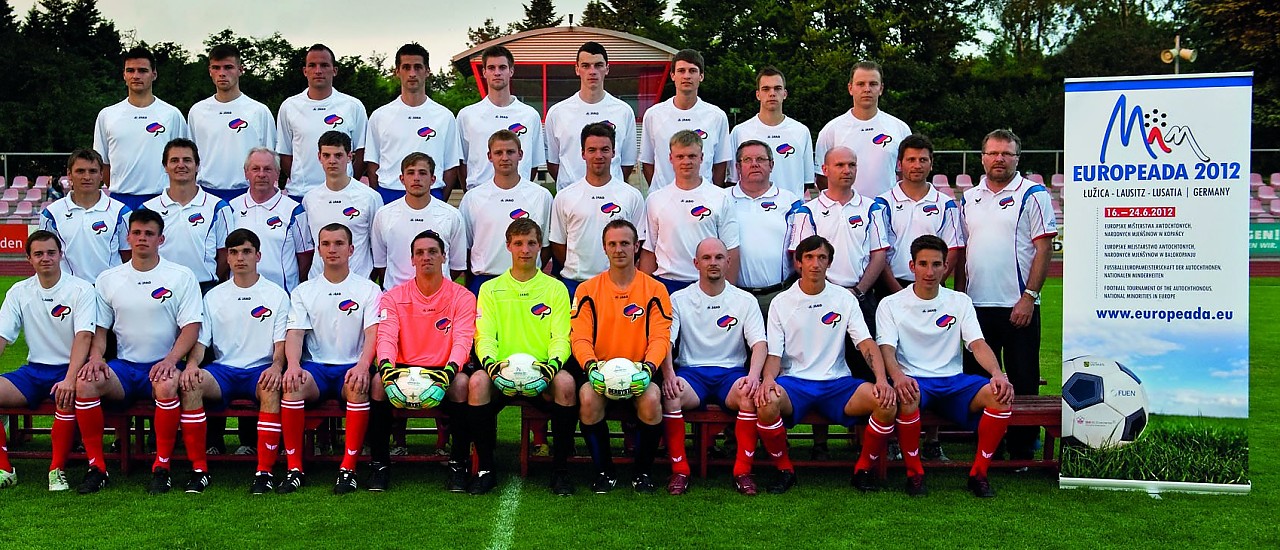Serbja - Lusatia
The Team "Serbja - Lusatia" represents the minority of the Sorbs in the Lusatia - Germany. More than 1,400 years ago the Slav tribes left their original area of settlement north-east of the Carpathian mountains during the Slav migration and moved westwards. Amongst them were various Sorbian tribes, like the Milceni and the Luzici. These tribes settled in a region between the river Saale, the river Oder and the mountain ranges of the Erzgebirge and the Fichtelgebirge. The first mention in writing of the group of tribes settled there, the "Surbi", was made by the Franconian chronicler Fredegar in the year 631.
After the loss of political independence in the tenth century assimilation and Germanisation reduced the settlement area of the Sorbs, primarily as a result of the influx of non-Slav populations. It was only the descendants of the Upper Lusatian Milceni and the Lower Lusatian Luzici who succeeded in maintaining their Sorbian language and culture up to the present day. The early nineteenth century saw the development of a Sorbian middle class, which led to a strengthening of Sorbian national consciousness. Numerous associations were founded, which were devoted to fostering the Sorbian language and culture and contributed to strengthening the common bonds of the Sorbs as a people. Today the Sorbs are one of the recognized autochthonous minorities in Germany. The Sorbs call themselves, "Serbja" or "Serby". In addition to these terms the Germans still use the term "Wenden" (Wends), especially in Lower Lusatia . This term can be traced back to Roman historians who used the term "Veneti" to describe tribes in the east, which were not known to them individually by name. From this the Germans derived the terms "Wenden" or "Winden" to describe the Slavs. The Sorbian language belongs to the Slavonic group of languages and has particular affinities with Polish, Czech and Slovak. Sorbian is spoken in a number of dialects in Upper and Lower Lusatia . The oldest document in the Sorbian written language is the "Burger Eydt Wendisch" (The Wendish Civic Oath) for Bautzen from around 1500; the oldest, hand-written, translation of the bible comes from the year 1548. The Serbs comprice approximately 60,000 speakers; of these about 40,000 live in Upper Lusatia and around 20,000 in Lower Lusatia .
Serbja - Lusatia at the EUROPEADA
In 2008 the Serbja Lusatia team was eliminated in the quarterfinal and archieved the 8th place, in 2012 optains the 6th place.
The squad by the EUROPEADA 2016
Hubertus Zschorlich (SV Zeißig), Christoph Gloxyn (Sokol Ralbitz/Horka), Patrick Wocko (SV Einheit Kamenz), Sebastian Ziesch (SG Crostwitz), Fabian Koreng (Sokol Ralbitz/Horka), Karl Petrick (FC Oberlausitz/Neugersdorf), Denny Krahl (FSV Budissa Bautzen), Peter Domaschke (Sokol Ralbitz Horka), Simon Sauer (SG Crostwitz), Sebastian Böhm (Sokol Ralbitz/Horka), Felix Rehor (SV Einheit Kamenz), Robert Lehnart (SG Nebelschütz), Sebastian Bensch (Sokol Ralbitz/Horka), David Jursch (SV Sankt Marienstern), Jonas Krautschick (FC Oberlausitz/Neugersdorf), Christian Böhmak (Sokol Ralbitz/Horka), Antonius Walde (Sokol Ralbitz/Horka), Dirk Scholze (Sokol Ralbitz/Horka), Sebastian Kindermann (FSV Budissa Bautzen), Denny Gloxyn (FSV Budissa Bautzen), Fabian Böhm (FV 06 Dresden Laubegast), Tadej Ziesche (SG Nebelschütz)
Frank Rietschel (Coach), Andre Strelow (Assistat Coach), Marko Kowar (Head of delegation), Bernhard Delenk (Team Manager), Daniel Rietschel (technical manager), Frank Domsch (Physiotherapist), Martin Spittank (Physiotherapist)








